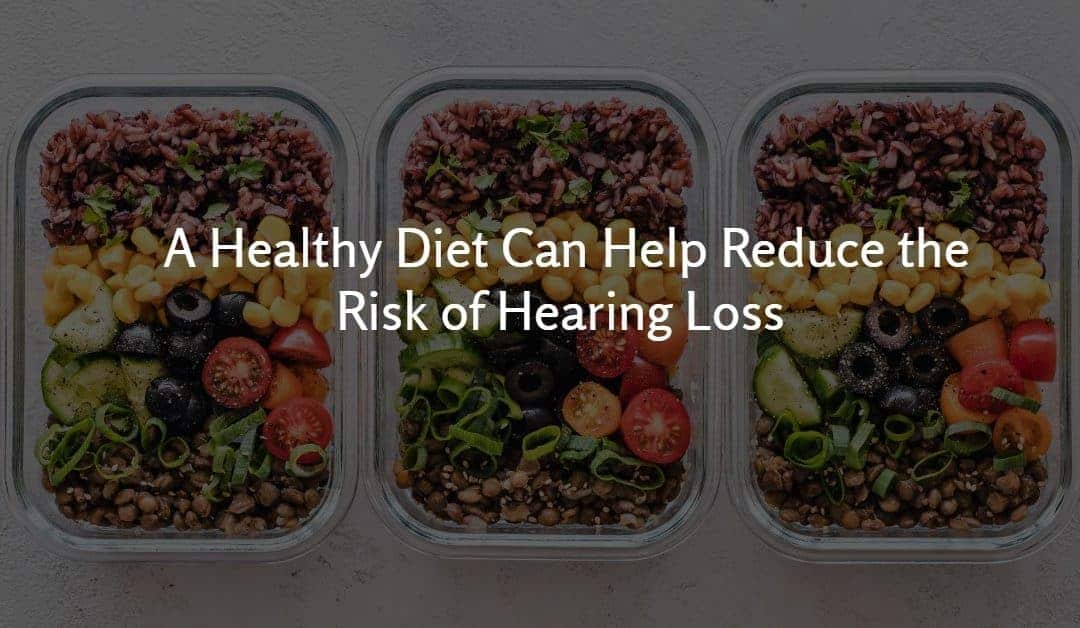Hearing loss is one of the most common chronic health conditions that people experience. A public health epidemic, impaired hearing can be caused by a variety of factors including genetic history, existing medical conditions, and environmental exposure to loud noise. One major misconception about hearing loss is that it’s a natural, or inevitable part of the aging process.
Simply put: when you are older, hearing loss happens. However, this actually is not true. People of all ages can and do navigate hearing loss and it is not an automatic occurrence as one ages. Additionally, there are ways that we can reduce the risk of developing hearing loss that includes eating a healthy diet. Healthy eating has countless benefits that contribute to the quality and longevity of our lives. One of the benefits of a healthy diet is that it can reduce the risk of hearing loss.
Impact of a Healthy Diet on Hearing Loss
There are several medical conditions that have been linked to the development of hearing loss including cardiovascular disease, hypertension, and diabetes. Eating a balanced diet supports a robust immune system, healthy blood flow and cholesterol levels, low blood pressure etc. This can prevent these chronic medical conditions and reduce the risk of hearing loss.
Several studies and research show that a healthy diet does in fact have a positive impact on hearing health. One of the most recent studies was conducted by researchers at Brigham and Women’s Hospital in Boston, Massachusetts in 2019. The data showed that people adhering to a healthy diet were significantly less likely to develop hearing loss. Published in the American Journal of Epidemiology, this study included 3,135 participants across the United States. Researchers analyzed dietary intake information that was collected every four years for 20 years in addition to results from hearing tests conducted by hearing healthcare professionals which measured hearing ability in both ears.
Researchers found that people who were closely following healthy diets were:
- 30% less likely to develop mid frequency hearing loss
- 25% less likely to develop high frequency hearing loss
These significant findings show the link between a healthy diet and reduced risk of hearing loss. It also shows that there are things we can change to prevent or delay the progression of hearing loss; further highlighting that it is not inherent to aging.
Types of Healthy Diets
We often think of diets as temporary, restrictive, regimented, and overall something you do not want to do. In this context, a healthy diet does not refer to a strict program but rather a broad way of eating that is more of an approach rather (and not a set of rules). In the study previously mentioned, researchers investigated the types of diets the participants were practicing and found that they closely resembled the general recommendations from three established diets:
- DASH (Dietary Approaches to Stop Hypertension)
- AMED (Alternate Mediterranean)
- AHEI-2010 (Alternate Healthy Index-2010)
These approaches to eating focus on plant-based foods and eliminating processed foods. They emphasize:
- increased intakes of vegetables, fruits, legumes, and whole grains
- limited intakes of dairy and meat
- eliminating processed foods (oils, sugars, grains etc.)
These essential characteristics of healthy eating provide the vitamins, minerals, nutrients, and fibers that keep the body energized, sustained, and strong. This drastically helps prevent diseases and contributes to an enhanced quality of life.
Nutrients for Healthy Hearing
There are various nutrients that are beneficial for healthy hearing including:
- Potassium: contributes to maintaining fluid levels found in the inner ear which is what helps translate soundwaves for the brain to process. Potassium rich foods include: spinach, broccoli, potatoes, mushrooms, fruits (bananas, oranges, cantaloupe).
- Magnesium: helps protect the hair cells in the inner ear. Magnesium rich foods include: kale, black beans, chickpeas, cabbage, artichokes, seafood, avocado, raspberries
- Folate (folic acid): helps maintain healthy cells. Folate rich foods include: citrus fruits (oranges, lemons, grapefruit), lentils, asparagus, beans, spinach
- Omega 3: contributes to reduced inflammation and low blood pressure. Omega 3 rich foods include: fish, chia seeds, flaxseed, nuts, tofu, brussels sprouts
Healthy eating can reduce your risk of medical conditions including hearing loss; radically improving your life and helping you feel your absolute best!

